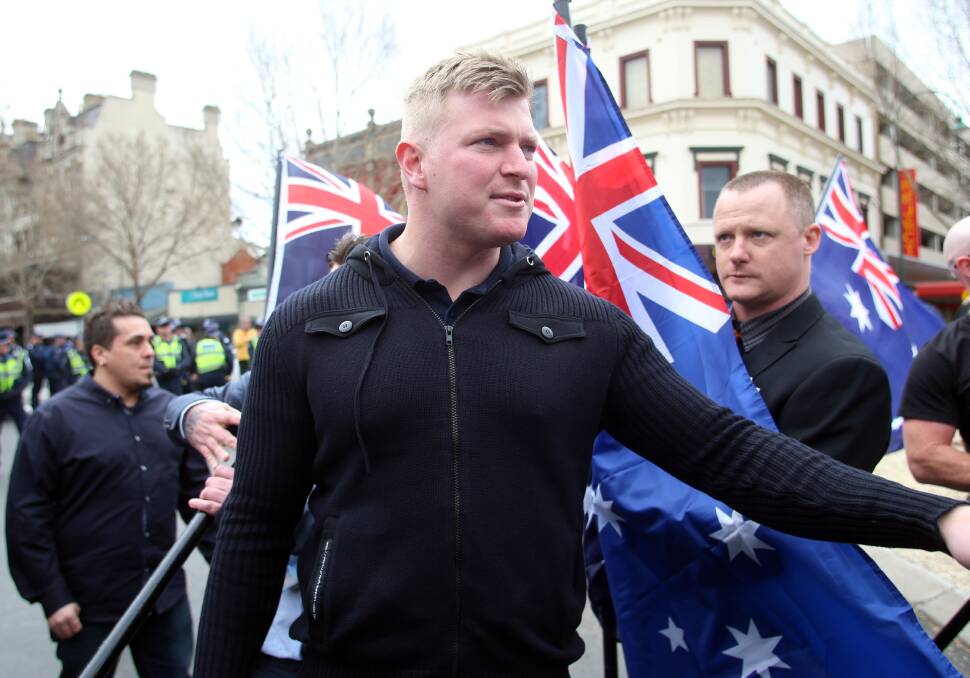
UPDATED
Subscribe now for unlimited access.
$0/
(min cost $0)
or signup to continue reading
Far-right extremist Blair Cottrell has lost his appeal against his conviction for stirring up hatred against Muslims by staging a mock beheading stunt in Bendigo.
The former leader of nationalist group United Patriots Front was convicted in 2017 of inciting contempt, revulsion or ridicule of Muslims after he and two other UPF members - Christopher Shortis and Neil Erikson - staged a stunt in protest against plans to construct a mosque in Bendigo.
Cottrell's conviction was reinstated and he was fined $2000 on Thursday.
County Court Chief Judge Paul Kidd found the charge brought against Cottrell was proved and the legislation under which he was charged was constitutionally valid.
Cottrell and the other two men filmed a mock beheading outside the City of Greater Bendigo offices in October 2015.
The conviction:
In the video, Cottrell says "we're going to give you a taste of our own religious culture" before Shortis and Erikson decapitate a dummy with a toy sword.
One wore a Middle Eastern-style head covering and the words "Allahu Akbar" were shouted.
The video was posted to the UPF Facebook page to promote an anti-mosque rally held in Bendigo several days later.
During the appeal, Cottrell gave evidence that the video was intended to inform the public about the mosque decision process in an "absurd and humorous" way, because he believed the process was being withheld from the public.
He denied the video was designed to incite contempt against Muslims, saying he was instead protesting the government.
But Chief Judge Kidd said he had no doubt that Cottrell acted as he did because of the religious beliefs of Muslims.
He said he was satisfied beyond reasonable doubt that Cottrell intended to stir up feelings of serious contempt, revulsion and severe ridicule.
"The only inference available is that the mock beheading scene was intended to whip up extreme negative feelings in the audience about Muslims, including fear, loathing, disgust and alarm," Chief Judge Kidd said.
The video was not created for entertainment, he said, but to galvanise people to attend the rally.
"In short, it is the appellant's participation in the mock beheading, within the broader context of his goal of drumming up support for and attendance at the rally, which convicts him," Chief Judge Kidd said.
The appeal:
Chief Judge Kidd also found that the law under which Cottrell was prosecuted did not impinge on the rights to freedom of expression, freedom of thought, conscience, religion and belief, or to participate in the conduct of public affairs.
If it did restrict such rights, he said, it did so only on the very margins.
Cottrell and his lawyer John Bolton had also argued that the section of the Racial and Religious Tolerance Act under which he was charged encroached upon the implied freedom of political communication under the Constitution.
Chief Judge Kidd found this was not the case and the law was valid.
He said the law was not intended to stifle political discussion and was relevant only to serious intentional vilification.
Cottrell's previous attempts to take his appeal to the Supreme Court and High Court also failed.
When magistrate John Hardy convicted Cottrell and his co-offenders in September 2017 after a two-day contested hearing, he said they had crossed a line.
"We live in a community that is extraordinarily diverse and each person is entitled to live their life without being subjected to wrongful conduct by others," Mr Hardy said.
The men were the first people to be convicted under the state's Racial and Religious Tolerance Act.
Have you signed up to the Bendigo Advertiser's daily newsletter and breaking news emails? You can register below and make sure you are up to date with everything that's happening in central Victoria.


